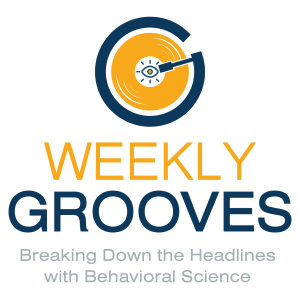
Stories, science and secrets from the world’s brightest thought-leaders. Behavioral Grooves is the podcast that satisfies your curiosity of why we do what we do. Explanations of human behavior that will improve your relationships, your wellbeing, and your organization by helping you find your groove.
Episodes

Sunday May 17, 2020
Gary Latham, PhD: Goal Setting, Prompts, Priming, and Skepticism
Sunday May 17, 2020
Sunday May 17, 2020
Gary Latham, PhD is the Secretary of State Professor of Organizational Behaviour at the Rotman School of Management in the University of Toronto. His research in the field of organizational psychology has yielded over 200 peer-reviewed publications and he has written several books on the topic of goal setting. He and his lifelong research partner, Ed Locke PhD, are responsible for Goal Setting Theory, prized by both the scientific community and sales leaders around the world.
He is the only recipient of both the Distinguished Contributions to Science award and the Practice award from SIOP. Top it off, he is only the second researcher we’ve talked to on Behavioral Grooves that was cited in Kurt’s dissertation.
In our discussion with Professor Latham, we reviewed Goal Setting Theory, specific goals, participatory goals and talked about the relative importance of inductive and deductive reasoning. More importantly, we covered some of our favorite research on priming and were able to have a discussion about Kurt’s socks: are they prompts or primes? (You’ll have to listen to find out.)
If you like what you hear, please feel free to give us a quick review or sign up for cool rewards on our Patreon site (link below). Thanks for your support.
NOTE: We encountered some technical challenges while recording our conversation with Professor Latham and it’s audio quality is slightly below our standards. We considered a re-do, but we decided to stick with our original conversation, which is what we present in this episode. We hope you enjoy it.
© 2020 Behavioral Grooves
Links
Gary Latham, PhD: https://www.rotman.utoronto.ca/FacultyAndResearch/Faculty/FacultyBios/Latham
Ed Locke, PhD: https://edwinlocke.com/
“Effects of goal setting and supervision on worker behavior in an industrial situation” (pulpwood industry study): https://psycnet.apa.org/record/1974-28825-001
“The effect of priming goals on organizational‑related behavior: My transition from skeptic to believer”: https://psycnet.apa.org/record/2017-56606-020
Amanda Shantz, PhD: https://www.tcd.ie/business/people/amanda-shantz.php
John Bargh, PhD: https://psychology.yale.edu/people/john-bargh
Scott Jeffrey, PhD: https://www.monmouth.edu/directory/profiles/scott-a-jeffrey/
Ron Piccolo, PhD: https://business.ucf.edu/person/ron-piccolo/
Farrah Fawcett Poster: https://en.wikipedia.org/wiki/Farrah_Fawcett
Jana Gallus, PhD and Bruno Frey, PhD: https://journals.sagepub.com/doi/abs/10.1177/0001839218777229
Victoria Shaffer, PhD: https://psychology.missouri.edu/people/shaffer
“The Influence of In-Store Music on Wine Selections”: https://mindhacks.com/2006/02/06/music-wine-and-will/
Kurt Nelson, PhD: @whatmotivates
Tim Houlihan: @THoulihan
Patreon Site for Behavioral Grooves: https://www.patreon.com/behavioralgrooves

Wednesday May 13, 2020
Covid-19 Crisis: Mariel Beasley on Increasing Short Term Savings During the Crisis
Wednesday May 13, 2020
Wednesday May 13, 2020
Mariel Beasley is the Co-Director of the Common Cents Lab at the Center for Advanced Hindsight at Duke University. She works on applications of behavioral research, primarily in the financial services sector and public policy arena. She holds a Master of Public Policy degree from Duke University and her previous work experience includes a variety of nonprofits and charitable foundations.
As the leader of Common Cents Lab, she often develops partnerships with financial institutions to put behavioral science to good use through improving products, services and experiences for low-to-moderate households.
We talked to Mariel about their work with low-to-middle-income households and the way the crisis is impacting them in ways that are not making headlines. Specifically, short-term savings rates are changing because so many households were caught flat-footed by mass layoffs, furloughs, and pay reductions. We also talked about how behavioral science helps us all to see problems better and gives us the tools to make better changes.
We also discussed upward and downward social comparisons that occur when peeking into the homes of coworkers on video calls, and about expectations for productivity might change as a result of our massive work-from-home experience.
We hope you enjoy our conversation with Mariel.
© 2020 Behavioral Grooves
Connect with Kurt and Tim:
Kurt Nelson, PhD: @WhatMotivates e-mail: kurt@lanterngroup.com
Tim Houlihan: @THoulihan e-mail: tim@behavioralchemy.com
Lantern Group: http://lanterngroup.com/
BehaviorAlchemy: https://www.behavioralchemy.com/
Behavioral Grooves: https://behavioralgrooves.com/
Weekly Grooves: https://weeklygrooves.podbean.com/
Common Biases & Heuristics: https://docs.google.com/document/d/1XHpBr0VFcaT8wIUpr-9zMIb79dFMgOVFRxIZRybiftI/edit#
Patreon Site for Behavioral Grooves: https://www.patreon.com/behavioralgrooves
General Coronavirus Info:
Daily Newsletter Summarizing data from Johns Hopkins Center for Health Security: http://www.centerforhealthsecurity.org/newsroom/newsletters/e-newsletter-sign-up.html
CDC: https://www.cdc.gov/coronavirus/2019-ncov/index.html
Great videos on the science behind this by Dr. Peter Attia – this is the first in a series: https://www.youtube.com/watch?v=CNVhLyAlfA4
What is herd immunity?: https://www.technologyreview.com/s/615375/what-is-herd-immunity-and-can-it-stop-the-coronavirus/
A list curated by Liam.Delaney@UCD.ie
https://docs.google.com/document/d/11GLhX7hLf64Bxkdpv5hvYHqOjS1imlcMQFjJBJ-9oUM/edit
Coronavirus & Behavioral Science:
Selected Links: The Behavioral Sice of Coronavirus: https://behavioralscientist.org/selected-links-the-behavioral-science-of-the-coronavirus-covid-19/
Why no one is reading your coronavirus email: https://edition.cnn.com/2020/03/13/opinions/coronavirus-emails-effective-messaging-rogers/index.html
Handwashing can stop a virus, so why don’t we do it?: https://behavioralscientist.org/handwashing-can-stop-a-virus-so-why-dont-we-do-it-coronavirus-covid-19/
The behavioral science of handwashing: https://think.ing.com/articles/the-behavioural-science-of-hand-washing/
Ideas 42: The Behavioral Side of COVID-19 here: https://ideas42.org/covid19/
Greater Good: https://twitter.com/GreaterGoodSC
How We Can Cope During This Crisis:
Tip Sheet from HUMU: https://humu.com/remote-nudges/
Resources for learning at home: https://fordhaminstitute.org/national/commentary/resources-learning-home-during-covid-19-school-closures?utm_source=join1440&utm_medium=email&utm_placement=etcetera
General Behavioral Science Links:
Common Biases and Heuristics: https://docs.google.com/document/d/1XHpBr0VFcaT8wIUpr-9zMIb79dFMgOVFRxIZRybiftI/edit#
Jonathan Haidt – 5 Moral Foundations: https://en.wikipedia.org/wiki/Moral_foundations_theory
Annie Duke’s “How To Decide”: https://www.amazon.com/How-Decide-Simple-Making-Choices/dp/0593084608
“16 Ways To Promote Hand Washing With Behavioral Science” article by Aline Holzwarth: https://www.forbes.com/sites/alineholzwarth/2020/03/25/handwashing-with-behavioral-science/#261b4b9f768d
Aline Holzwarth’s Playlist on Spotify: https://open.spotify.com/playlist/0H5fsQRrqslGdBhhx8d4Aw?si=0jra0rU1Qu2vQNtqjbRvZA
Deontological and Consequential Moralities: https://plato.stanford.edu/entries/ethics-deontological/#DeoTheKan
Difference between descriptive and injunctive norms: https://psychology.stackexchange.com/questions/6193/whats-the-difference-between-injunctive-norms-and-descriptive-norms
Emotion Research from FinalMile: http://finalmile.in/research/
Pandemic Playbook from FinalMile: https://www.playbookforpandemic.com/

Monday May 11, 2020
Samuel Salzer: Benefits and Perils of Streaks
Monday May 11, 2020
Monday May 11, 2020
Samuel Salzer is a leading behavioral strategist and habit expert, having worked with organizations across Europe, Australia, and North America. Among other things, he’s one of the first Chief Behavioral Officer's (CBO) in tech, applying insights from behavioral science and behavioral economics to build user-centered and habit-forming products and services.
At the forefront of the emerging field of Behavioral Design, Samuel is a frequent keynote speaker, curates the popular newsletter Habit Weekly, and has co-authored “Nudging in Practice - Helping organizations make it easy to do the right thing.” The book offers a comprehensive guide to organizations interested in understanding and systematically utilizing behavioral insights.
In our conversation with Samuel, we discussed streaks, those things that happen when we do something consistently over a long-period of time. They provide ongoing motivation to do the behavior which can help it become automatic. However, they can also feel daunting. We also talked about how habits are contextual. And lastly, we discussed how powerful and underappreciated cognitive dissonance is.
In our Grooving Session, Kurt and Tim discussed streaking and why having dinner with a favorite musician (songwriter) might be better than a sports celebrity. Hope you enjoy our conversation!
Finally, we end with a cut from a yet-unreleased record by Kurt and Tim: “Cognitive Dissonance.” Some of the lyrics: “I’m making up a story / To relieve the contradiction / Between what I want to be and what I do.”
© 2020 Behavioral Grooves
Links
Samuel Salzer: https://samuelsalzer.com/
Habit Weekly: https://habitweekly.com/
Behavioral Science & Design Thinking Online Course: besci.org/grooves
Wendy Wood, “Good Habits, Bad Habits”: https://goodhabitsbadhabits.com/
Charles Duhigg: “The Power of Habit”: https://charlesduhigg.com/the-power-of-habit/
Phillippa Lally: https://centrespringmd.com/docs/How%20Habits%20are%20Formed.pdf
Maxwell Maltz – 21 Days to Habit: https://www.forbes.com/sites/jasonselk/2013/04/15/habit-formation-the-21-day-myth/#1f194c7bdebc
James Clear: https://jamesclear.com/
“Mistakes Were Made (but not by me)”: https://en.wikipedia.org/wiki/Mistakes_Were_Made_(but_Not_by_Me)
Streaking: https://en.wikipedia.org/wiki/Exhibitionism#Streaking
Deci & Ryan: https://www.apa.org/members/content/intrinsic-motivation
Teresa Amabile, PhD: https://www.hbs.edu/faculty/Pages/profile.aspx?facId=6409
Musical Links
Hans Zimmer “Inception”: https://www.youtube.com/watch?v=xdYYN-4ttDg
Ray Stevens “The Streak”: https://www.youtube.com/watch?v=XtzoUu7w-YM
David Byrne: https://livemusicblog.com/news/david-byrne-saturday-night-live-video/
Talking Heads: https://www.youtube.com/watch?v=PBIlxmug8PU

Tuesday May 05, 2020
Covid-19 Crisis: Kaveh Yasdifard on Uniting Innovators from Tehran
Tuesday May 05, 2020
Tuesday May 05, 2020
Kaveh Yazdifard is the Chief Innovation Officer at Sahab Pardaz located in Tehran, Iran. He is also the Director of Urban Innovation for the city and COO of Avatech Accelerator, a firm focused on empowering business startups through a values-driven culture.
While much of Kaveh’s work is focused on collaborating and creating value through Innovation, we were particularly interested in speaking with him about the way he applies Cognitive Psychology and Data Science to his work.
And at this writing, Kaveh and his teams are developing initiatives in Iran to help individuals and businesses survive the uncertainty and ambiguity of the crisis. And we found this particularly interesting.
Of all of the business ideas that were exchanged, we landed on a particularly provocative comment: Happiness is overrated. During this time, it caused us to stop and ponder a bit. Maybe you will, too.
Links
Connect with Kurt and Tim:
Kurt Nelson, PhD: @WhatMotivates e-mail: kurt@lanterngroup.com
Tim Houlihan: @THoulihan e-mail: tim@behavioralchemy.com
Lantern Group: http://lanterngroup.com/
BehaviorAlchemy: https://www.behavioralchemy.com/
Behavioral Grooves: https://behavioralgrooves.com/
Weekly Grooves: https://weeklygrooves.podbean.com/
Common Biases & Heuristics: https://docs.google.com/document/d/1XHpBr0VFcaT8wIUpr-9zMIb79dFMgOVFRxIZRybiftI/edit#
Patreon Site for Behavioral Grooves: https://www.patreon.com/behavioralgrooves
General Coronavirus Info:
Daily Newsletter Summarizing data from Johns Hopkins Center for Health Security: http://www.centerforhealthsecurity.org/newsroom/newsletters/e-newsletter-sign-up.html
CDC: https://www.cdc.gov/coronavirus/2019-ncov/index.html
Great videos on the science behind this by Dr. Peter Attia – this is the first in a series: https://www.youtube.com/watch?v=CNVhLyAlfA4
What is herd immunity?: https://www.technologyreview.com/s/615375/what-is-herd-immunity-and-can-it-stop-the-coronavirus/
A list curated by Liam.Delaney@UCD.ie
https://docs.google.com/document/d/11GLhX7hLf64Bxkdpv5hvYHqOjS1imlcMQFjJBJ-9oUM/edit
Coronavirus & Behavioral Science:
Selected Links: The Behavioral Sice of Coronavirus: https://behavioralscientist.org/selected-links-the-behavioral-science-of-the-coronavirus-covid-19/
Why no one is reading your coronavirus email: https://edition.cnn.com/2020/03/13/opinions/coronavirus-emails-effective-messaging-rogers/index.html
Handwashing can stop a virus, so why don’t we do it?: https://behavioralscientist.org/handwashing-can-stop-a-virus-so-why-dont-we-do-it-coronavirus-covid-19/
The behavioral science of handwashing: https://think.ing.com/articles/the-behavioural-science-of-hand-washing/
Ideas 42: The Behavioral Side of COVID-19 here: https://ideas42.org/covid19/
Greater Good: https://twitter.com/GreaterGoodSC
How We Can Cope During This Crisis:
Tip Sheet from HUMU: https://humu.com/remote-nudges/
Resources for learning at home: https://fordhaminstitute.org/national/commentary/resources-learning-home-during-covid-19-school-closures?utm_source=join1440&utm_medium=email&utm_placement=etcetera
General Behavioral Science Links:
Common Biases and Heuristics: https://docs.google.com/document/d/1XHpBr0VFcaT8wIUpr-9zMIb79dFMgOVFRxIZRybiftI/edit#
Jonathan Haidt – 5 Moral Foundations: https://en.wikipedia.org/wiki/Moral_foundations_theory
Annie Duke’s “How To Decide”: https://www.amazon.com/How-Decide-Simple-Making-Choices/dp/0593084608
“16 Ways To Promote Hand Washing With Behavioral Science” article by Aline Holzwarth: https://www.forbes.com/sites/alineholzwarth/2020/03/25/handwashing-with-behavioral-science/#261b4b9f768d
Aline Holzwarth’s Playlist on Spotify: https://open.spotify.com/playlist/0H5fsQRrqslGdBhhx8d4Aw?si=0jra0rU1Qu2vQNtqjbRvZA
Deontological and Consequential Moralities: https://plato.stanford.edu/entries/ethics-deontological/#DeoTheKan
Difference between descriptive and injunctive norms: https://psychology.stackexchange.com/questions/6193/whats-the-difference-between-injunctive-norms-and-descriptive-norms
Emotion Research from FinalMile: http://finalmile.in/research/
Pandemic Playbook from FinalMile: https://www.playbookforpandemic.com/

Sunday May 03, 2020
Covid-19 Crisis: Gretchen Chapman, PhD on The Psychology of Vaccinations
Sunday May 03, 2020
Sunday May 03, 2020
Gretchen Chapman, PhD researches how we make decisions about vaccines. She is a Professor in the Social & Decision Sciences department at Carnegie Mellon University and works across disciplines in both fields of judgment and decision making as well as health psychology.
She is the recipient of an APA early career award and an NJ Psychological Association Distinguished Research Award, a fellow of APA and APS. She is a former senior editor at Psychological Science, a past president of the Society for Judgment & Decision Making, the author of more than 100 journal articles, and the recipient of 20 years of continuous external funding.
Our discussion covered a great deal of her work based on laboratory and field experiments, where she has tested behavioral interventions, simultaneously exploring the theoretical mechanisms of decision making and also yielding policy insights into methods for improving health behavior and health outcomes.
We talked about vaccination rates on influenza (between 33% to 50% of adults), measles (around 95%) and what impact a potential coronavirus vaccine might have on other vaccinations.
Her expert knowledge was particularly valuable in a world with lots of noise.
© 2020 Behavioral Grooves
Links
Connect with Kurt and Tim:
Kurt Nelson, PhD: @WhatMotivates e-mail: kurt@lanterngroup.com
Tim Houlihan: @THoulihan e-mail: tim@behavioralchemy.com
Lantern Group: http://lanterngroup.com/
BehaviorAlchemy: https://www.behavioralchemy.com/
Behavioral Grooves: https://behavioralgrooves.com/
Weekly Grooves: https://weeklygrooves.podbean.com/
Common Biases & Heuristics: https://docs.google.com/document/d/1XHpBr0VFcaT8wIUpr-9zMIb79dFMgOVFRxIZRybiftI/edit#
Patreon Site for Behavioral Grooves: https://www.patreon.com/behavioralgrooves
General Coronavirus Info:
Daily Newsletter Summarizing data from Johns Hopkins Center for Health Security: http://www.centerforhealthsecurity.org/newsroom/newsletters/e-newsletter-sign-up.html
CDC: https://www.cdc.gov/coronavirus/2019-ncov/index.html
Great videos on the science behind this by Dr. Peter Attia – this is the first in a series: https://www.youtube.com/watch?v=CNVhLyAlfA4
What is herd immunity?: https://www.technologyreview.com/s/615375/what-is-herd-immunity-and-can-it-stop-the-coronavirus/
A list curated by Liam.Delaney@UCD.ie
https://docs.google.com/document/d/11GLhX7hLf64Bxkdpv5hvYHqOjS1imlcMQFjJBJ-9oUM/edit
Coronavirus & Behavioral Science:
Selected Links: The Behavioral Sice of Coronavirus: https://behavioralscientist.org/selected-links-the-behavioral-science-of-the-coronavirus-covid-19/
Why no one is reading your coronavirus email: https://edition.cnn.com/2020/03/13/opinions/coronavirus-emails-effective-messaging-rogers/index.html
Handwashing can stop a virus, so why don’t we do it?: https://behavioralscientist.org/handwashing-can-stop-a-virus-so-why-dont-we-do-it-coronavirus-covid-19/
The behavioral science of handwashing: https://think.ing.com/articles/the-behavioural-science-of-hand-washing/
Ideas 42: The Behavioral Side of COVID-19 here: https://ideas42.org/covid19/
Greater Good: https://twitter.com/GreaterGoodSC
How We Can Cope During This Crisis:
Tip Sheet from HUMU: https://humu.com/remote-nudges/
Resources for learning at home: https://fordhaminstitute.org/national/commentary/resources-learning-home-during-covid-19-school-closures?utm_source=join1440&utm_medium=email&utm_placement=etcetera
General Behavioral Science Links:
Common Biases and Heuristics: https://docs.google.com/document/d/1XHpBr0VFcaT8wIUpr-9zMIb79dFMgOVFRxIZRybiftI/edit#
Jonathan Haidt – 5 Moral Foundations: https://en.wikipedia.org/wiki/Moral_foundations_theory
Annie Duke’s “How To Decide”: https://www.amazon.com/How-Decide-Simple-Making-Choices/dp/0593084608
“16 Ways To Promote Hand Washing With Behavioral Science” article by Aline Holzwarth: https://www.forbes.com/sites/alineholzwarth/2020/03/25/handwashing-with-behavioral-science/#261b4b9f768d
Aline Holzwarth’s Playlist on Spotify: https://open.spotify.com/playlist/0H5fsQRrqslGdBhhx8d4Aw?si=0jra0rU1Qu2vQNtqjbRvZA
Deontological and Consequential Moralities: https://plato.stanford.edu/entries/ethics-deontological/#DeoTheKan
Difference between descriptive and injunctive norms: https://psychology.stackexchange.com/questions/6193/whats-the-difference-between-injunctive-norms-and-descriptive-norms
Emotion Research from FinalMile: http://finalmile.in/research/
Pandemic Playbook from FinalMile: https://www.playbookforpandemic.com/

Friday May 01, 2020
Friday May 01, 2020
Jules Nolan, PhD is a psychologist, speaker, and author. She is the president of the Minnesota School Psychology Association and chairwoman for the Human Diversity Committee for the International School Psychology Association.
Her research, which has been conducted and published internationally, focuses on behavior, achievement, and wellbeing for school-aged children. She consults with parents and educators on how to manage family life and classrooms to help all children thrive.
We talked to Jules to get her thoughts into how she assists families with the unfamiliar experience of being together constantly. Jules delivered insightful comments, terrific research references, and relevant tips on what real families can do at this time.
If you’re a parent, you’ll benefit from her real-world directives; and if you’re a teacher, you’re likely to pick up some tips that could make your own virtual work a little less stressful.
© 2020 Behavioral Grooves
Connect with Kurt and Tim:
Kurt Nelson, PhD: @WhatMotivates e-mail: kurt@lanterngroup.com
Tim Houlihan: @THoulihan e-mail: tim@behavioralchemy.com
Lantern Group: http://lanterngroup.com/
BehaviorAlchemy: https://www.behavioralchemy.com/
Behavioral Grooves: https://behavioralgrooves.com/
Weekly Grooves: https://weeklygrooves.podbean.com/
Common Biases & Heuristics: https://docs.google.com/document/d/1XHpBr0VFcaT8wIUpr-9zMIb79dFMgOVFRxIZRybiftI/edit#
Patreon Site for Behavioral Grooves: https://www.patreon.com/behavioralgrooves
General Coronavirus Info:
Daily Newsletter Summarizing data from Johns Hopkins Center for Health Security: http://www.centerforhealthsecurity.org/newsroom/newsletters/e-newsletter-sign-up.html
CDC: https://www.cdc.gov/coronavirus/2019-ncov/index.html
Great videos on the science behind this by Dr. Peter Attia – this is the first in a series: https://www.youtube.com/watch?v=CNVhLyAlfA4
What is herd immunity?: https://www.technologyreview.com/s/615375/what-is-herd-immunity-and-can-it-stop-the-coronavirus/
A list curated by Liam.Delaney@UCD.ie
https://docs.google.com/document/d/11GLhX7hLf64Bxkdpv5hvYHqOjS1imlcMQFjJBJ-9oUM/edit
Coronavirus & Behavioral Science:
Selected Links: The Behavioral Sice of Coronavirus: https://behavioralscientist.org/selected-links-the-behavioral-science-of-the-coronavirus-covid-19/
Why no one is reading your coronavirus email: https://edition.cnn.com/2020/03/13/opinions/coronavirus-emails-effective-messaging-rogers/index.html
Handwashing can stop a virus, so why don’t we do it?: https://behavioralscientist.org/handwashing-can-stop-a-virus-so-why-dont-we-do-it-coronavirus-covid-19/
The behavioral science of handwashing: https://think.ing.com/articles/the-behavioural-science-of-hand-washing/
Ideas 42: The Behavioral Side of COVID-19 here: https://ideas42.org/covid19/
Greater Good: https://twitter.com/GreaterGoodSC
How We Can Cope During This Crisis:
Tip Sheet from HUMU: https://humu.com/remote-nudges/
Resources for learning at home: https://fordhaminstitute.org/national/commentary/resources-learning-home-during-covid-19-school-closures?utm_source=join1440&utm_medium=email&utm_placement=etcetera
General Behavioral Science Links:
Common Biases and Heuristics: https://docs.google.com/document/d/1XHpBr0VFcaT8wIUpr-9zMIb79dFMgOVFRxIZRybiftI/edit#
Jonathan Haidt – 5 Moral Foundations: https://en.wikipedia.org/wiki/Moral_foundations_theory
Annie Duke’s “How To Decide”: https://www.amazon.com/How-Decide-Simple-Making-Choices/dp/0593084608
“16 Ways To Promote Hand Washing With Behavioral Science” article by Aline Holzwarth: https://www.forbes.com/sites/alineholzwarth/2020/03/25/handwashing-with-behavioral-science/#261b4b9f768d
Aline Holzwarth’s Playlist on Spotify: https://open.spotify.com/playlist/0H5fsQRrqslGdBhhx8d4Aw?si=0jra0rU1Qu2vQNtqjbRvZA
Deontological and Consequential Moralities: https://plato.stanford.edu/entries/ethics-deontological/#DeoTheKan
Difference between descriptive and injunctive norms: https://psychology.stackexchange.com/questions/6193/whats-the-difference-between-injunctive-norms-and-descriptive-norms
Emotion Research from FinalMile: http://finalmile.in/research/
Pandemic Playbook from FinalMile: https://www.playbookforpandemic.com/

Wednesday Apr 29, 2020
Thanks For No Memories During the Coronavirus Pandemic
Wednesday Apr 29, 2020
Wednesday Apr 29, 2020
Our inspiration this week comes from an article written by Shayla Love for Vice titled, “You’ll probably forget what it was like to live through a pandemic.” We thought it would make a great jumping-off point for how we will remember this time as well as a discussion on memory in general.
We explore how memories get shaped during historically significant times and how vividness and emotion play into those memories. But, as Shayla notes, we don’t remember things all that accurately.
She points out that our specific memory of this time, even with all it’s heightened emotions and significance, will become, as she says, “a blur.”
She goes on to say, “Those on the frontlines, like healthcare workers, will remember it differently. They'll witness the toll on human life firsthand and emotions like grief, fear, and anxiety will heighten their memories….[but] For those whose lives remain unscathed, who have the privilege of waiting out the weeks without much daily variety, this stretched out "historical event" isn't conducive to creating sharp, defined memories. Despite having conscious awareness of each moment now, a lot of it will slip away.”
We hope you enjoy this episode of Weekly Grooves.
© 2020 Weekly Grooves / © 2020 Behavioral Grooves
Links
“You’ll probably forget what it was like to live through a pandemic.” By Shayla Love: https://www.vice.com/en_us/article/5dmxvn/what-will-we-remember-from-the-coronavirus-covid19-pandemic
You have no idea what happened (New Yorker): https://www.newyorker.com/science/maria-konnikova/idea-happened-memory-recollection
A new false memory study suggest people can’t tell what's real: https://gizmodo.com/a-new-false-memory-study-suggests-people-cant-tell-what-1842751404
How our brains make memories: https://www.smithsonianmag.com/science-nature/how-our-brains-make-memories-14466850/
Did That Really Happen? How Our Memories Betray Us: https://www.npr.org/2019/12/16/788422090/did-that-really-happen-how-our-memories-betray-us

Tuesday Apr 28, 2020
Covid-19 Crisis: Greg Davies, PhD on the Fetish of Optimization
Tuesday Apr 28, 2020
Tuesday Apr 28, 2020
Greg Davies, PhD is a specialist in applied behavioral finance, decision science, impact investing, and financial wellbeing. He founded the banking world’s first behavioral finance team at Barclays in 2006, which he led for a decade. In 2017 he joined Oxford Risk to lead the development of behavioral decision support software to help people make the best possible financial decisions.
Greg holds a PhD in Behavioural Decision Theory from Cambridge; he has held academic affiliations at UCL, Imperial College, and Oxford; and is author of Behavioral Investment Management. Greg is also Chair of Sound and Music, the UK’s national charity for new music, and the creator of Open Outcry, a ‘reality opera’ premiered in London in 2012, creating live performance from a functioning trading floor.
We invited Greg to have a conversation about COVID-19 because of his very academic view of how our financial decisions are made in the real world. We found his insights to be invaluable as we discussed the importance of using NOW as the time to build resistance for the next crisis – it’s only a matter of time.
We discussed how to use Odysseus contracts to ensure we make decisions in a “cold” state that will bind us to behaviors in “hot” states. And one of the more provocative comments, especially coming from a financial guy, was how our world would benefit from giving the “fetish of optimization.”
You’ll want to check it out.
© 2020 Behavioral Grooves
Links
Connect with Kurt and Tim:
Kurt Nelson, PhD: @WhatMotivates e-mail: kurt@lanterngroup.com
Tim Houlihan: @THoulihan e-mail: tim@behavioralchemy.com
Lantern Group: http://lanterngroup.com/
BehaviorAlchemy: https://www.behavioralchemy.com/
Behavioral Grooves: https://behavioralgrooves.com/
Weekly Grooves: https://weeklygrooves.podbean.com/
Common Biases & Heuristics: https://docs.google.com/document/d/1XHpBr0VFcaT8wIUpr-9zMIb79dFMgOVFRxIZRybiftI/edit#
Patreon Site for Behavioral Grooves: https://www.patreon.com/behavioralgrooves
General Coronavirus Info:
Daily Newsletter Summarizing data from Johns Hopkins Center for Health Security: http://www.centerforhealthsecurity.org/newsroom/newsletters/e-newsletter-sign-up.html
CDC: https://www.cdc.gov/coronavirus/2019-ncov/index.html
Great videos on the science behind this by Dr. Peter Attia – this is the first in a series: https://www.youtube.com/watch?v=CNVhLyAlfA4
What is herd immunity?: https://www.technologyreview.com/s/615375/what-is-herd-immunity-and-can-it-stop-the-coronavirus/
A list curated by Liam.Delaney@UCD.ie
https://docs.google.com/document/d/11GLhX7hLf64Bxkdpv5hvYHqOjS1imlcMQFjJBJ-9oUM/edit
Coronavirus & Behavioral Science:
Selected Links: The Behavioral Sice of Coronavirus: https://behavioralscientist.org/selected-links-the-behavioral-science-of-the-coronavirus-covid-19/
Why no one is reading your coronavirus email: https://edition.cnn.com/2020/03/13/opinions/coronavirus-emails-effective-messaging-rogers/index.html
Handwashing can stop a virus, so why don’t we do it?: https://behavioralscientist.org/handwashing-can-stop-a-virus-so-why-dont-we-do-it-coronavirus-covid-19/
The behavioral science of handwashing: https://think.ing.com/articles/the-behavioural-science-of-hand-washing/
Ideas 42: The Behavioral Side of COVID-19 here: https://ideas42.org/covid19/
Greater Good: https://twitter.com/GreaterGoodSC
How We Can Cope During This Crisis:
Tip Sheet from HUMU: https://humu.com/remote-nudges/
Resources for learning at home: https://fordhaminstitute.org/national/commentary/resources-learning-home-during-covid-19-school-closures?utm_source=join1440&utm_medium=email&utm_placement=etcetera
General Behavioral Science Links:
Common Biases and Heuristics: https://docs.google.com/document/d/1XHpBr0VFcaT8wIUpr-9zMIb79dFMgOVFRxIZRybiftI/edit#
Jonathan Haidt – 5 Moral Foundations: https://en.wikipedia.org/wiki/Moral_foundations_theory
Annie Duke’s “How To Decide”: https://www.amazon.com/How-Decide-Simple-Making-Choices/dp/0593084608
“16 Ways To Promote Hand Washing With Behavioral Science” article by Aline Holzwarth: https://www.forbes.com/sites/alineholzwarth/2020/03/25/handwashing-with-behavioral-science/#261b4b9f768d
Aline Holzwarth’s Playlist on Spotify: https://open.spotify.com/playlist/0H5fsQRrqslGdBhhx8d4Aw?si=0jra0rU1Qu2vQNtqjbRvZA
Deontological and Consequential Moralities: https://plato.stanford.edu/entries/ethics-deontological/#DeoTheKan
Difference between descriptive and injunctive norms: https://psychology.stackexchange.com/questions/6193/whats-the-difference-between-injunctive-norms-and-descriptive-norms
Emotion Research from FinalMile: http://finalmile.in/research/
Pandemic Playbook from FinalMile: https://www.playbookforpandemic.com/

Sunday Apr 26, 2020
Iris Tzafrir: A Kind Word
Sunday Apr 26, 2020
Sunday Apr 26, 2020
Iris Tzafrir is an inspirational and influential cross-functional leader in strategy and business development, deal making, value actualization, and merger integration. She grew up in a Kibbutz in the Negev Desert of Israel, the daughter of 2 Holocaust survivors, and emigrated to the US for graduate school where she studied virology. She loves to learn and is committed to making the world a better place.
We asked her to join us to discuss her insights on anti-racism, recognition of the other, and the importance of working together in teams (a key element of this is inclusion). Iris is, in our opinion, an accidental behavioral scientist. She’s not trained in the terminology or interventions of behavioral science, yet it’s evident that she possesses great skills in framing and messaging. We found her journey from telling her parent’s Holocaust story to telling her own story an important example of applied behavioral science.
This episode is not so much about her life as the daughter of 2 Holocaust survivors as it is about her insights into the human condition. We hope you find her practices and insights helpful.
Lastly, our discussion with Iris ends around 36:20 where left us with a unique proposition. We urge you to listen to her read a short poem composed by her father. It’s called, “A Kind Word.”
© 2020 Behavioral Grooves
Links
"A Kind Word": https://www.linkedin.com/posts/iris-tzafrir_kindnessmatters-kindness-kindnessiscontagious-activity-6651629471386394624-NqLD
Iris Tzafrir: https://www.linkedin.com/in/iris-tzafrir/
The Holocaust: https://en.wikipedia.org/wiki/The_Holocaust
Robert Cialdini, PhD: https://en.wikipedia.org/wiki/Robert_Cialdini
Cristina Bicchieri, PhD “The Grammar of Society”: https://www.amazon.com/Grammar-Society-Nature-Dynamics-Social/dp/0521574900
Albert Bandura, PhD: “The Bobo Doll Effect”: https://www.youtube.com/watch?v=dmBqwWlJg8U
Musical Links
Idan Raichel: https://idanraichelproject.com/en/
Achinoam Nini: http://www.noasmusic.com/
Hadag Nachash: http://hadagnahash.com/en/main/
Chava Albershtein: https://www.aviv2.com/chava/
Rhianna: https://www.youtube.com/watch?v=wfN4PVaOU5Q
Billie Eilish: https://www.youtube.com/watch?v=EgBJmlPo8Xw
Miles Davis: https://www.youtube.com/watch?v=Tcg2Do13RJc
“We Are The World”: https://www.youtube.com/watch?v=I04FcfIVtcU
“What the World Needs Now”: https://www.youtube.com/watch?v=qv7jI5ACHCw

Monday Apr 20, 2020
Covid-19 Crisis: Anurag Vaish on Risk is a Feeling, Not a Number
Monday Apr 20, 2020
Monday Apr 20, 2020
Anurag Vaish is the co-founder and director of The FinalMile in Mumbai, India. In building the company's practice of Behavior Architecture, Anurag led the conceptualization and development of digital games as a platform for research.
Anurag brings over 17 years of experience in strategic planning, research and marketing communication. Our conversation with him allowed him to highlight some of the work FinalMile is doing with the Indian government.
More importantly, Anurag and his team are building a Pandemic Playbook (link below) which is an archive of data points, interventions, communication, trends in activities and observations and it will be available for the world and for future crises.
One of his greatest observations is that because we experience risk as a feeling, not a set of numbers, many world leaders are missing an opportunity to improve the effectiveness of their communication. He’s also looking at how self (distance) learning could be carried on after the virus.
© 2020 Behavioral Grooves
Links
Connect with Kurt and Tim:
Kurt Nelson, PhD: @WhatMotivates e-mail: kurt@lanterngroup.com
Tim Houlihan: @THoulihan e-mail: tim@behavioralchemy.com
Lantern Group: http://lanterngroup.com/
BehaviorAlchemy: https://www.behavioralchemy.com/
Behavioral Grooves: https://behavioralgrooves.com/
Weekly Grooves: https://weeklygrooves.podbean.com/
Common Biases & Heuristics: https://docs.google.com/document/d/1XHpBr0VFcaT8wIUpr-9zMIb79dFMgOVFRxIZRybiftI/edit#
Patreon Site for Behavioral Grooves: https://www.patreon.com/behavioralgrooves
General Coronavirus Info:
Daily Newsletter Summarizing data from Johns Hopkins Center for Health Security: http://www.centerforhealthsecurity.org/newsroom/newsletters/e-newsletter-sign-up.html
CDC: https://www.cdc.gov/coronavirus/2019-ncov/index.html
Great videos on the science behind this by Dr. Peter Attia – this is the first in a series: https://www.youtube.com/watch?v=CNVhLyAlfA4
What is herd immunity?: https://www.technologyreview.com/s/615375/what-is-herd-immunity-and-can-it-stop-the-coronavirus/
A list curated by Liam.Delaney@UCD.ie
https://docs.google.com/document/d/11GLhX7hLf64Bxkdpv5hvYHqOjS1imlcMQFjJBJ-9oUM/edit
Coronavirus & Behavioral Science:
Selected Links: The Behavioral Sice of Coronavirus: https://behavioralscientist.org/selected-links-the-behavioral-science-of-the-coronavirus-covid-19/
Why no one is reading your coronavirus email: https://edition.cnn.com/2020/03/13/opinions/coronavirus-emails-effective-messaging-rogers/index.html
Handwashing can stop a virus, so why don’t we do it?: https://behavioralscientist.org/handwashing-can-stop-a-virus-so-why-dont-we-do-it-coronavirus-covid-19/
The behavioral science of handwashing: https://think.ing.com/articles/the-behavioural-science-of-hand-washing/
Ideas 42: The Behavioral Side of COVID-19 here: https://ideas42.org/covid19/
Greater Good: https://twitter.com/GreaterGoodSC
How We Can Cope During This Crisis:
Tip Sheet from HUMU: https://humu.com/remote-nudges/
Resources for learning at home: https://fordhaminstitute.org/national/commentary/resources-learning-home-during-covid-19-school-closures?utm_source=join1440&utm_medium=email&utm_placement=etcetera
General Behavioral Science Links:
Common Biases and Heuristics: https://docs.google.com/document/d/1XHpBr0VFcaT8wIUpr-9zMIb79dFMgOVFRxIZRybiftI/edit#
Jonathan Haidt – 5 Moral Foundations: https://en.wikipedia.org/wiki/Moral_foundations_theory
Annie Duke’s “How To Decide”: https://www.amazon.com/How-Decide-Simple-Making-Choices/dp/0593084608
“16 Ways To Promote Hand Washing With Behavioral Science” article by Aline Holzwarth: https://www.forbes.com/sites/alineholzwarth/2020/03/25/handwashing-with-behavioral-science/#261b4b9f768d
Aline Holzwarth’s Playlist on Spotify: https://open.spotify.com/playlist/0H5fsQRrqslGdBhhx8d4Aw?si=0jra0rU1Qu2vQNtqjbRvZA
Deontological and Consequential Moralities: https://plato.stanford.edu/entries/ethics-deontological/#DeoTheKan
Difference between descriptive and injunctive norms: https://psychology.stackexchange.com/questions/6193/whats-the-difference-between-injunctive-norms-and-descriptive-norms
Emotion Research from FinalMile: http://finalmile.in/research/
Pandemic Playbook from FinalMile: https://www.playbookforpandemic.com/
